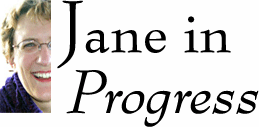 |
|
 |
 |
Looking for tips and tricks to the art of writing for television? Welcome to the blog of experienced television writer Jane Espenson. Check it out regularly to learn about spec scripts, writing dos and don'ts, and what Jane had for lunch! (RSS:  ) |
|
|
Home » Archives » May 2008 » Keeping Promises
[Previous entry: "What We Realize"] [Next entry: "The Singular of Apocalypse"]
05/03/2008: Keeping Promises
I'm still up here in Vancouver, watching production of my next episode. It's exhausting but fun. One of the things I've been doing is making last-minute cuts to shorten too-long scenes. It's been making me think a lot about how to keep a scene short and focused and strong.
If you're tackling this in your own script, I suggest trying what I've been doing: recreating a beatsheet like the one you wrote at your pre-outline stage, only even shorter. Just make a list of the one crucial thing that happens in each scene. Sometimes two crucial things happen in a scene, especially if an A-story and a B-story are both involved, but usually no more than that. So I mean, literally a couple words for each scene: "Joe tells Carrie his secret." "Leslie starts the house fire." "Jeremy blames his father for his failings." "The soldier starts to regret his actions." Then look at the scene and find the part where that happens -- sometimes it's all in one line or one action. Decide on the absolute minimum you'd have to keep to fulfill the promise of your little beatsheet. Declare all the rest expendable.
Now, this isn't really true, of course. The heartbeat of a script is in all the stuff that might not be strictly necessary for this scene, but that gives a world its texture, and fleshes out a character so that their actions reflect a full and believable person. If you cut everything but story, you'd have a synopsis, not an episode. But keeping your eye on the function of the scene within the story is crucial and sometimes surprisingly difficult. If you know exactly what the scene needs to do, you can bring a slightly more objective eye to the cutting process. I've been amazed sometimes when I've realized that some four-page scene I've written actually plays better -- is sharper and more emotional -- as a one-page scene. You don't always lose when you cut. The bones of your story show up better when you take some of the fat off.
Even if you don't need to lose length off your script, I recommend that at some point you make one of these little reconstructed beatsheets, just to keep your focus on the most basic shape of your story, the real function of every scene. It will keep you from wandering off into the maze.
Lunch: steak, which I shared with a beagle who lives in the Set Dec Department. I love food from the set.
|
|
|
 |
|
Get Blog Updates Via Email
|
|
 |

